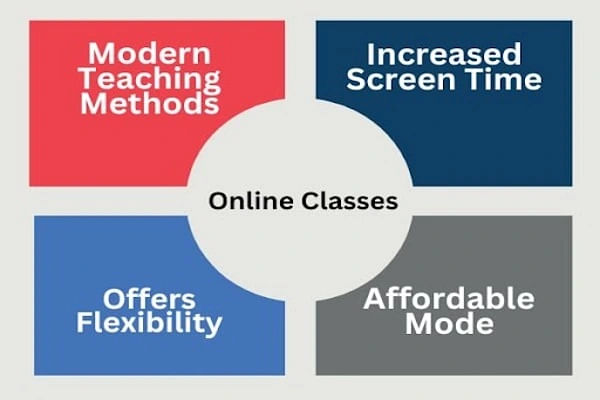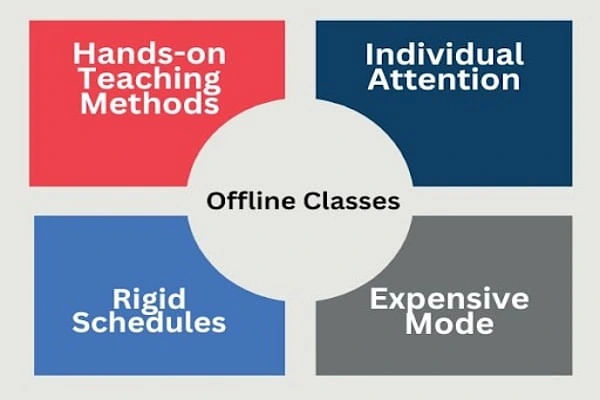Comparison of online classes vs offline classes can be evaluated and understood by factors like the method of teaching, presentation, location factor, scheduling flexibility, and focus on students.
Online classes vs offline classes: The online classes offer flexibility in schedule, they are conducted virtually and are cost-effective. At the same time offline classes have rigid schedules, they are conducted at a specific location and are comparatively costlier.
Offline classes are a traditional method of teaching, whereas online classes are modern and advanced teaching techniques. The choice between online and offline classes clearly depends on the ability of students, learning preferences, goals, and circumstances, and they should consider all the associated factors to decide what suits them best.
Online Classes vs Offline Classes
An overview of online classes vs offline classes is tabulated below in a comprehensive manner for student's reference.
| Parameters | Online Classes | Offline Classes |
| Method of Teaching | Modern and digitized teaching techniques | Traditional method of teaching |
| Presentation Method | Video and Audio method | Audio and drawing on board method |
| Cost and Time | Cost-effective and time-saving | Comparatively expensive than online education and more time consuming. |
| Location | Virtual classrooms | Physical classrooms |
| Flexibility | Online classes have a flexible schedule | Offline classes have a fixed and strict schedule |
| Focus On Students | Students are less serious and less committed. | Students are comparatively more serious and more committed. |
Online Classes

Online learning has developed a flexible teaching style that allows students to quickly access the infinite resource of study materials from their homes. Online education also aids students in selecting their own pace for learning and offers a great chance for those who are unable to enroll in regular classroom settings.
- Students attending online classes easily access to vast amount of enriching educational resources and eventually learn to manage their time and self-discipline.
- If the students have the required tools and access to a reliable internet connection, they can simply determine their learning speed.
Advantages of Online Classes
The advantages of online classes are listed below for students' reference:
- Flexible Environment and Schedule: No fact can disprove the difference between online classes vs offline classes. Thanks to the online learning environment, students now have the freedom to create the learning environment that best meets their needs.
- Self-discipline: The students gradually develop self-discipline throughout their personal study time at home. They can become masters at using their time wisely. They learn to plan out their classes, homework, homework assignments, classes, and other customary school activities.
- Affordability: Education has gotten a little bit easier to get since online classes became popular. There is a huge cost cutting on multiple things like cost of uniforms, transportation which is eventually making education more affordable and accessible for both students and parents.
Disadvantages of Online Classes
- Increased Screen Time: One of the main obstacles faced by online learners is managing their screen time. Online learning demands regular, lengthy periods of logged-in time. Long-term usage of a screen stresses students out and is detrimental to their general health, especially the eyes.
- Technical troubles: Technical troubles are yet another negative. Online sessions frequently experience issues with slow Internet access. The hardest places to maintain an Internet connection are cities and small towns. The students' capacity to study is destroyed.
- Isolation: people feeling lonely, minimal peer support, and less productive group work than it would be if done offline.
Read More: 5 Advantages And Disadvantages Of Online Education
Offline Classes

The traditional method of learning, known as offline learning, has been around since the beginning of time. It involves direct communication between a student and a teacher in a specific physical location.
- From Monday through Saturday, offline sessions are held in a conventional classroom where students are required to follow the rules.
- Offline courses combine theoretical and practical instruction with a variety of extracurricular activities to advance student’s knowledge and abilities.
Advantages of Offline Classes
The advantages of online classes are listed below:
- Hands-on practice: Typically, students in online classes do not have the chance to participate in hands-on practice in a variety of topic areas. The only way to learn a subject more thoroughly is in traditional classroom settings.
- Greater Student Involvement and Interaction: There is more interaction between the peers and the lecturers in face-to-face learning so they get to take part in additional classroom exercises in collective manner.
- Fewer distractions: Professors exclusively focus on teaching in offline classes. Thus, students are less likely to get distracted while studying. They give the lecture material their undivided attention.
- Individual attention: Teachers pay close attention to every student, which helps students to perform better in exams. They gain a deeper understanding of every subject and easily build a concrete foundation for future.
Disadvantages of Offline Classes
The disadvantages of offline classes are listed below:
- Location: The institutions providing offline classes are all at the same location, therefore, each student must make specific travel arrangements to get there. Money must be spent on the additional trip and preparation time, and time that could be used for independent study is lost.
- Rigid Schedules: Offline classes don't offer much flexibility because the timings are set. Although the reason for this is unclear, students who work 20 hours a week or full-time have a higher dropout rate.
- Expensive mode: As we already established, offline study is an expensive method of learning. This is in addition to the price of tuition, boarding, and transit costs to campuses.
| IIIT Online Courses | NIT Online Courses |
Which is Better: Online Classes or Offline Classes?
There are strong debates on whether online classes are superior to offline classes, regardless of the reasons mentioned earlier. Some believe that even the most advanced EdTech cannot equal the quality of knowledge, extracurricular activities, and practical teaching that offline learning delivers.
- The decision between online classes and offline programs depends on a number of variables, including personal preferences, environmental considerations, and the learner's particular educational objectives.
- The choice between online and offline classes ultimately comes down to personal preferences, learning preferences, goals, and circumstances.
- While some students might enjoy the comfort and flexibility of online learning, others could do better in a traditional classroom situation.
- When making this decision, it's critical to thoroughly assess your requirements and priorities.
Also Check: 10 Applications of AI in Education in 2023










